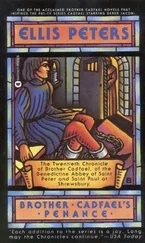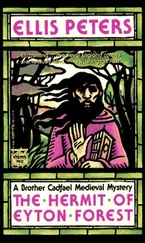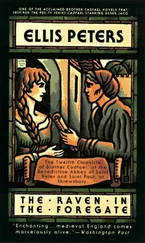When it was time to raise the litter and its burden, now stretched out decently with his twisted legs drawn out straight and his hands laid quietly at his sides, Sioned looked round for one more to whom she meant to confide a share in this honourable load. She did not find him.
“Where is Peredur? What became of him?”
No one had seen him go, but he was gone. No one had had attention to spare for him after Brother John had completed what Peredur had begun. He had slipped away without a word, as though he had done something to be ashamed of, something for which he might expect blame rather than thanks. Sioned was a little hurt, even in her greater hurt, at his desertion.
“I thought he would have wanted to help me bring my father home. He was a favourite with him, and fond of him. From a little boy he was in and out of our house like his own.”
“He maybe doubted his welcome,” said Cadfael, “after saying a word that displeased you concerning Engelard.”
“And doing a thing afterwards that more than wiped that out?” she said, but for his ears only. No need to say outright before everyone what she knew very well, that Peredur had contrived a way out for her lover. “No, I don’t understand why he should slink away without a word, like this.” But she said no more then, only begged him with a look to walk with her as she fell in behind the litter. They went some distance in silence. Then she asked, without looking aside at him: “Did my father yet tell you those things he had to tell?”
“Some,” said Cadfael. “Not all.”
“Is there anything I should do, or not do? I need to know. We must make him seemly tonight.” By the morrow he would be stiff, and she knew it. “If you need anything from me, tell me now.”
“Keep me the clothes he’s wearing, when you take them off him, and take note for me where they’re damp from this morning’s rain, and where they’re dry. If you notice anything strange, remember it. Tomorrow, as soon as I can, I’ll come to you.”
“I must know the truth,” she said. “You know why.”
“Yes, I know. But tonight sing him and drink to him, and never doubt but he’ll hear the singing.”
“Yes,” she said, and loosed a great, renewing sigh. “You are a good man. I’m glad you’re here. You do not believe it was Engelard.”
“I’m as good as certain it was not. First and best, it isn’t in him. Lads like Engelard hit out in passion, but with their fists, not with weapons. Second, if it had been in his scope, he’d have made a better job of it. You saw the angle of the arrow. Engelard, I judge, is the breadth of three fingers taller than your father. How could he shoot an arrow under a man’s rib-cage who is shorter than he, even from lower ground? Even if he kneeled or crouched in the undergrowth in ambush, I doubt if it could be done. And why should it ever be tried? No, this is folly. And to say that the best shot in all these parts could not put his shaft clean through his man, at any distance there where he could see him? Not more than fifty yards clear in any direction. Worse folly still, why should a good bowman choose such a blind tangled place? They have not looked at the ground, or they could not put forward such foolishness. But first and last and best, that young man of yours is too open and honest to kill by stealth, even a man he hated. And he did not hate Rhisiart. You need not tell me, I know it.”
Much of what he had said might well have been hurtful to her, but none of it was. She went with him every step of that way, and flushed and wanned into her proper, vulnerable girlhood at hearing her lover thus accepted.
“You’ve said no word in wonder,” she said, “that I have not been more troubled over what has become of Engelard, and where he is gone to earth now.”
“No,” said Cadfael, and smiled. “You know where he is, and how to get in touch with him whenever you need. I think you two have two or three places better for secrecy than your oak tree, and in one of them Engelard is resting now, or soon will be. You seem to think he’ll be safe enough. Tell me nothing, unless you need a messenger, or help.”
“You can be my messenger, if you will, to another,” she said. They were emerging from the forest at the edge of Rhisiart’s home fields, and Prior Robert stood tall and grim and noncommittal aside from their path, his companions discreetly disposed behind him, his hands, features, and the angle of his gently bowed head all disposed to convey respect for death and compassion for the bereaved without actually owning to forgiveness of the dead. His prisoner was safely lodged, he was waiting only to collect the last stray from his flock, and make an appropriately impressive exit. “Tell Peredur I missed him from among those my father would have liked to carry him home. Tell him what he did was generous, and I am grateful. I am sorry he should ever have doubted it.”
They were approaching the gate, and Uncle Meurice, the steward, came out to meet them with his kindly, soft-lined face quaking and shapeless with shock and distress.
“And come tomorrow,” said Sioned on an almost soundless breath, and walked away from him alone, and entered the gateway after her father’s body.
Sioned’s message might not have been delivered so soon, for it would not have been any easy matter to turn aside at Cadwallon’s house, without a word of request or excuse to Prior Robert; but in the dimness of the woods, a little above the holding, Cadfael caught a glimpse of a figure withdrawing from them, with evident intent, some fifty yards into cover, and knew it for Peredur. He had not expected to be followed, for he went only far enough to be secure from actual encounter on the path, and there sat down moodily on a fallen trunk, his back against a young tree that leaned with him, and kicked one foot in the litter of last year’s leaves. Cadfael asked no permission, but went after him.
Peredur looked up at the sound of other feet rustling the beech-mast, and rose as if he would have removed further to avoid speech, but then gave up the thought, and stood mute and unwelcoming, but resigned.
“I have a word to you,” said Brother Cadfael mildly, “from Sioned. She bade me to tell you that she missed you when she would gladly have asked you to lend a shoulder for her father’s bier. She sends you word that what you did was generous, and she is grateful.”
Peredur stirred his feet uneasily, and drew a little back into deeper shadow.
“There were plenty of her own people there,” he said, after a pause that seemed awkward rather than sullen. “She had no need of me.”
“Oh, there were hands enough, and shoulders enough,” agreed Cadfael, “nevertheless, she missed you. It seems to me that she looks upon you as one having a forward place among her own people. You have been like a brother to her from children, and she could do well with a brother now.”
The stiffness of Peredur’s young body was palpable even in the green dusk, a constraint that crippled even his tongue. He got out, with a bitter spurt of laughter: “It was not her brother that I wanted to be.”
“No, that I understand. Yet you behaved like one, towards her and towards Engelard, when it came to the testing.”
What was meant to comfort and compliment appeared, instead, to hurt. Peredur shrank still deeper into his morose stillness. “So she feels she has a debt to me, and wants to pay it but not for my sake. She does not want me.”
“Well,” said Cadfael equably, “I have delivered her message, and if you’ll go to her she’ll convince you, as I cannot. There was another would have wanted you there, if he could have spoken.”
“Oh, hush!” said Peredur, and jerked his head aside with a motion of sudden pain. “Don’t say more….”
Читать дальше












